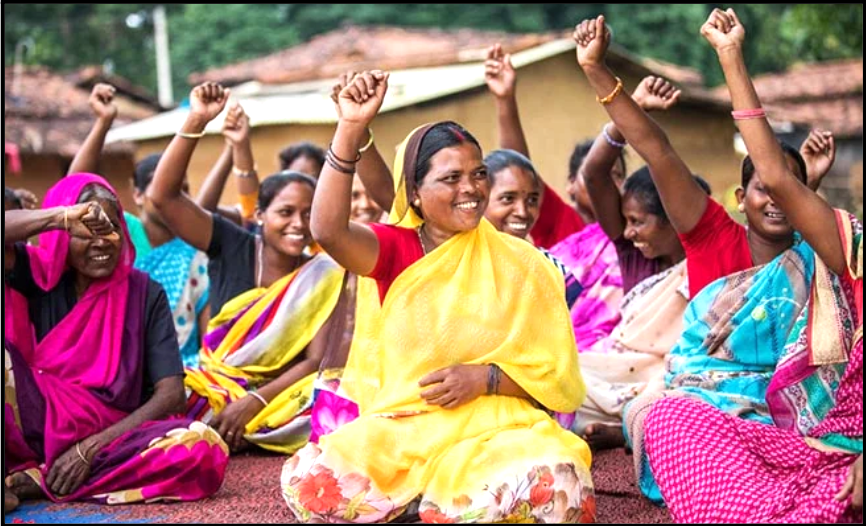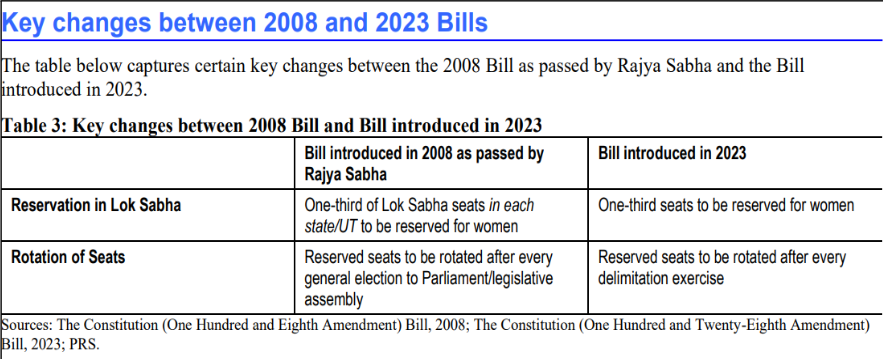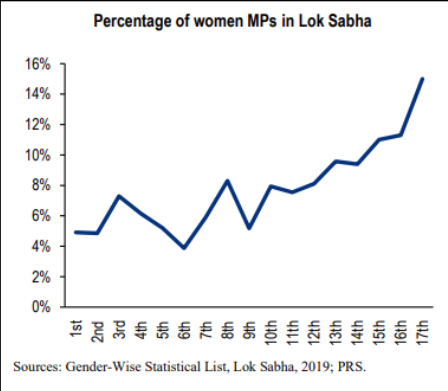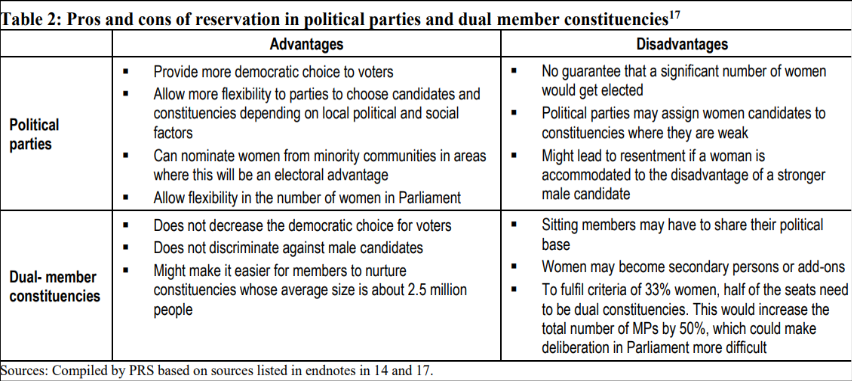
GS-2 Polity
Why in the news?
The parliament has passed the women’s reservation Bill – the Constitution (One Hundred and Twenty-Eighth Amendment) Bill, 2023.
What is the Women Reservation Bill?
The Women's Reservation Bill is a bill passed in the Parliament (not in Rajya sabha) of India which says to amend the Constitution of India to reserve 1/3 of all seats in the lower house of Parliament of India, the Lok Sabha, and in all state legislative assemblies for women.
Features of the Bill
The Women Reservation Bill aims to allocate one-third of the total seats in the Lok Sabha and state legislative assemblies specifically for women.
- The bill presented in the Lok Sabha by the Union Minister of Law and Justice closely resembles the legislation that was approved by the Rajya Sabha in 2010, known as the 108th Constitutional Amendment Bill of 2008.
- The authority designated by Parliament will decide the allocation of reserved seats.
- Reserved seats can be distributed among various constituencies within the state or union territory on a rotational basis.
- The proposed Bill suggests a comparable provision for state legislatures in the states and Delhi.
- Nevertheless, this allocation will not be applicable to the Rajya Sabha or state Legislative Councils.
- Just like the 2010 Bill, the current legislation also contains a sunset provision, stipulating that the reservation will be valid for a period of 15 years starting from the date when the Act comes into effect.
Timeline
- In 1996, the 81st Amendment Bill was first introduced in the Lok Sabha under the leadership of Deve Gowda's United Front government.
- However, it didn't receive approval in the house and was subsequently referred to a joint parliamentary committee.
- Despite the committee's report submission, the bill expired when the Lok Sabha was dissolved.
- In 1998, the NDA government led by Atal Bihari Vajpayee reintroduced the bill, but it faced a similar fate due to insufficient support.
- The bill was reintroduced in 1999, 2002, and 2003, but it failed to pass each time due to a lack of a majority.
- In 2008, the bill resurfaced as the 108th Constitution Amendment Bill and successfully passed in the Rajya Sabha. However, it once again lapsed after the 15th Lok Sabha was dissolved.

Why is WRB important?
Historically, societal restrictions and discrimination have harmed women.
- Caste groups – A strategy for women's reservation should align with constitutional principles and account for the diversity among caste groups.
- Gender quota – Without the implementation of a gender quota, women's representation would remain limited, posing a significant threat to the strength of our democracy.
- Panchayats – Recent studies on panchayats have revealed that reservation policies have had a positive effect on both resource distribution and the empowerment of women.
- Vote share – Although the proportion of women participating in voting has risen, there remains an insufficient presence of women in positions of power.
How many women participate in Parliament?
Presently in the Indian Parliament, more than 14% of its members are women, marking the highest level of female representation thus far.

- However, according to the Inter-Parliamentary Union, India lags behind its neighbouring countries like Nepal, Pakistan, Sri Lanka, and Bangladesh in terms of the percentage of women in the lower House, which is a concerning statistic.
Arguments in favour of the Bill
- The implementation of affirmative action is crucial to improve the status of women, given that our society as a whole, and political parties in particular, inherently lean towards a patriarchal system.
- Although the framers of the constituent assembly believed in proportional representation for all sections of society, women continue to be inadequately represented in Parliament.
- Reserving seats for women would ensure the presence of a potent advocacy group that would raise important issues that are often overlooked.
- Despite some instances where they are seen as symbolic, reservations for women at the panchayat level have yielded positive outcomes.
- Women are more inclined to invest in essential goods for women and children.
- The prevalent societal challenges such as crimes against women, an imbalanced sex ratio, low labour force participation rates, and subpar health indicators necessitate a greater presence of women in policy making and decision-making roles.
Arguments against the Bill
- Critics argue that implementing this policy could reinforce the perception that women are not competing on the basis of merit, potentially perpetuating their unequal status.
- They also maintain that this approach shifts the focus away from broader electoral reform issues, such as addressing the criminalization of politics and promoting inner-party democracy.
- The reservation of parliamentary seats could limit voters' choices to female candidates.
- The practice of rotating reserved constituencies in each election might diminish the motivation for an Member of Parliament (MP) to actively work for their constituency, as they could become ineligible for re-election in that same constituency.
- It's important to recognize that women's interests are interconnected with various other societal, economic, and political factors.
Alternative ways of representing Women in politics
Other methods of representation have been proposed. Reserving one-third of parliamentary seats for women could limit voter choices in those constituencies. Some experts suggest two alternatives: reserving positions for women within political parties (as done in some countries), or introducing dual member constituencies where each constituency elects two candidates, one of whom is a woman. Initially, India had multi-member constituencies with an SC/ST member, but these were converted to single-member constituencies in 1961 due to concerns about constituency size and SC/ST members' influence in single-member reserved constituencies.
Conclusion
The Women's Reservation Bill, recently passed in the Lok Sabha, seeks to reserve one-third of parliamentary seats for women. While facing arguments both for and against, it is a vital step toward gender equality in politics, addressing historical injustices, empowering women, and ensuring their voices are heard. Its implementation can strengthen India's democracy and society.
